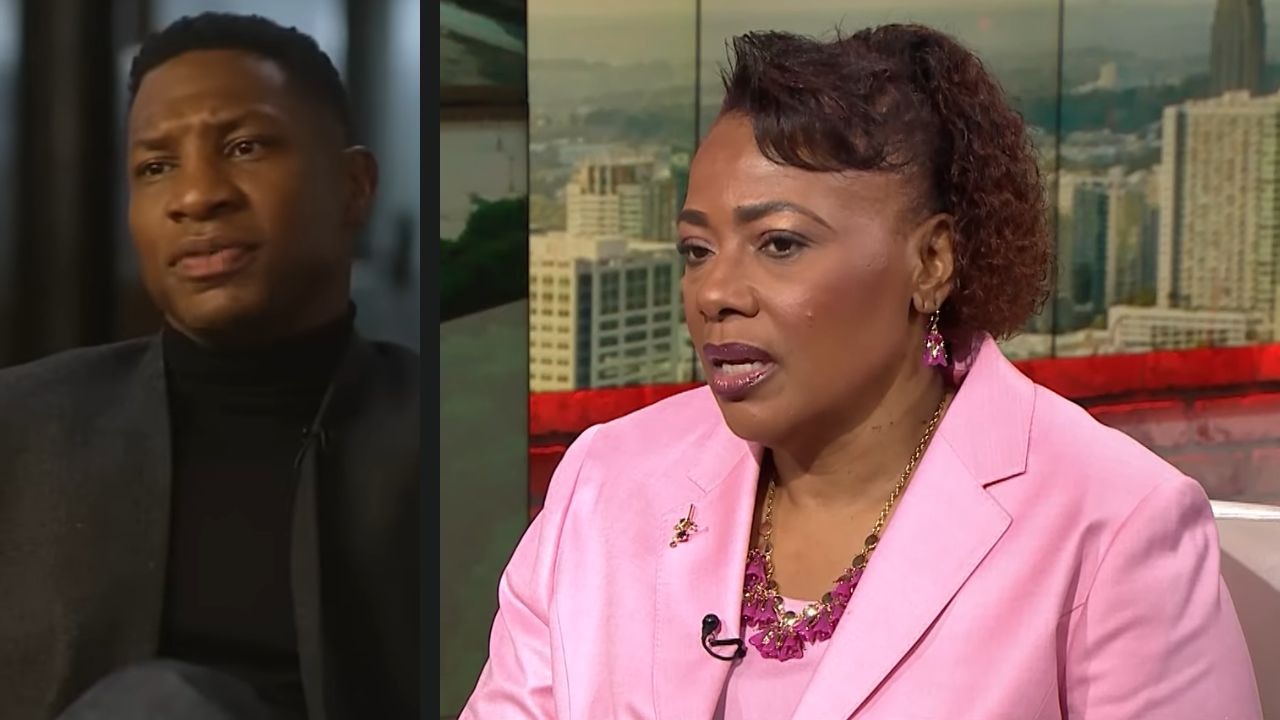
Bernice King responded to Jonathan Majors after referring to her mother, Coretta-Scott King. Majors’ words add to an ongoing theme of civil rights leaders’ names being inappropriately mentioned.
‘My Mother Wasn’t A Prop’
On Jan. 9, Bernice King, the daughter of the late Dr. Martin Luther King Jr., shared a post on Twitter (X) featuring a picture of her mother, Coretta Scott King. She accompanied the image with the following caption:
“My mother wasn’t a prop. She was a peace advocate before she met my father and was instrumental in him speaking out against the Vietnam War. Please understand…my mama was a force.”
The post was a subliminal response to actor Jonathan Majors, who had voicemails revealed in court during his domestic assault trial that he wanted his ex-girlfriend to “be more like Coretta Scott-King or Michelle Obama,” although she is a white woman.
Rap Songs That Reference Civil Rights Leaders
Reflecting on the criticism Jonathan Majors faced for making a similar reference brings to mind instances when other hip-hop artists made the same mistake. Here are top five highlights where rappers referenced Civil Rights icons inappropriately in their lyrics:
Kanye West/Emmett Till – ‘Through The Wire’
Kanye West has mentioned Emmett Till several times throughout his career. Till was a 14-year-old boy who was kidnapped and brutally murdered for allegedly flirting with a white woman in 1955. In Ye’s 2004 hit “Through The Wire,” he rapped:
“How do you console my mom or give her light support? Telling her, her son’s on life support/And just imagine how my girl feel/On the plane scared as hell that her guy look like Emmett Till,” referring to Till’s mutilated face in his open casket.
Lil Wayne/Emmett Till – ‘Karate Chop (Remix)’
In 2013, rap legend Lil Wayne was under fire for also referencing Till. The controversial lyrics were in the “Karate Chop (Remix)” with Atlanta rapper Future. In the song, Lil Wayne rapped:
“Pop a lot of pain pills/ Bout to put rims on my skateboard wheels / Beat that p*ssy up like Emmett Till.” In an open letter, Lil Wayne agreed to stop using Till’s name, vowing “to uplift rather than degrade our community.”
In February 2013, Till’s cousin Airickca Gordon-Taylor was among those who condemned the lyric:
“[It is] offensive not only to us, but to our ancestors and to women and to [the artists] themselves as young, black men,” “Our family was very offended, very hurt … [and] disturbed by [the line].”
Till’s family did not accept his apology.
OutKast/Rosa Parks – ‘Rosa Parks’
Legendary Atlanta rap duo OutKast’s 1998 hit “Rosa Parks” included a line that referenced the act that Rosa Parks did in 1955 by not giving up her seat to a white man on a segregated bus. In the chorus, the duo rapped:
“Ah-ha, hush that fuss/Everybody move to the back of the bus.”
A lawsuit was filed by attorney Gregory J Reed in March 1999 against Outkast and LaFace Records on Parks’s behalf, claiming that the group had illegally used her name without her permission. The lawsuit was settled on April 15, 2005.
In the settlement agreement, Outkast and their producer and record labels paid Parks an undisclosed cash settlement and agreed to work with the Rosa and Raymond Parks Institute for Self-Development in creating educational programs about the life of Rosa Parks.
Jay-Z/Harry Belafonte – ‘Nickels and Dimes’
Jay-Z was in an argument with the now-late iconic actor, singer, and civil rights activist Harry Belafonte.
In a 2012 interview, Belafonte called out the rap legend, his wife Beyoncé, and other Black artists because “they have turned their back on social responsibility.” When asked if he was happy about minorities in Hollywood in present times.
Jay-Z would respond to Belafonte’s comments on his 2013 song “Nickels and Dimes. ” In the song, the New York native rapped:
“I’m just trying to find common ground / Before Mr. Belafonte come and chop a n*gga down / Mr. Day-O, major fail.”
Tupac Shakur/C. Dolores Tucker – ‘How Do U Want It’
The late Tupac Shakur caused controversy when he targeted C. Dolores Tucker, a former Secretary of the Commonwealth of Pennsylvania and civil rights activist, in his 1996 song “How Do U Want It.” In the song, Tupac rapped:
“C. Delores Tucker, you’s a motherf*cker/Instead of tryin’ to help a n*gga, you destroy a brother/Worse than the others, Bill Clinton, Mr. Bob Dole/You’re too old to understand the way the game’s told.”
Dolores Tucker engaged in a campaign against rap music in the 1990s. She condemned rap music for its “violent and misogynistic content.”
Ye compares Himself To Emmett Till
Along with mentioning Emmet Till in “Through The Wire,” Kanye West also compared himself to Till in a rant with media members in October 2022. He also called out Endeavor CEO Ari Emmauel and others for trying to “cancel him,” after his anti-semitic comments.
Eazy-E’s Daughter Speaks Out
This pattern of rappers facing criticism from family members of late stars is not an isolated incident. In 2021, Ebie Wright, daughter of late N.W.A. rapper Eazy-E, publicly called out Ice Cube in a documentary for avoiding discussions about her father.
The post Bernice King Addresses Jonathan Majors + Top 5 Rappers’ Controversial References To Civil Rights Leaders appeared first on SOHH.com.
